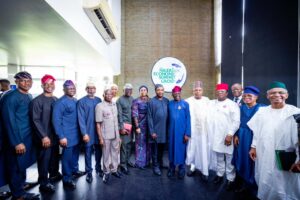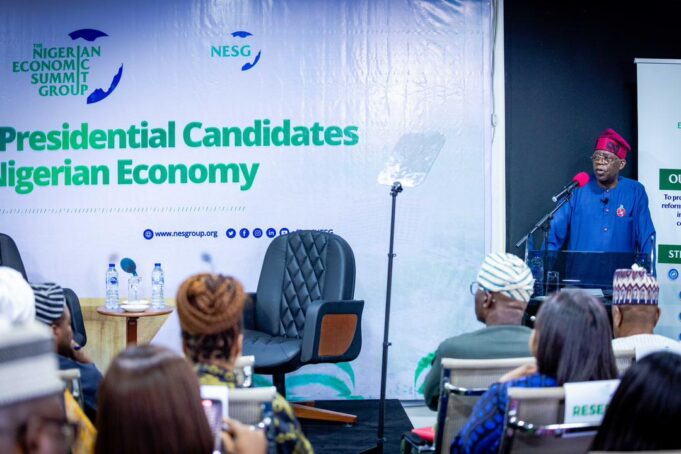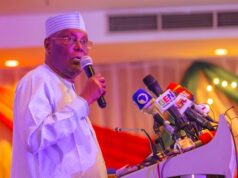The presidential candidate of the All Progressives Congress (APC), Asiwaju Bola Tinubu, has promised to address fiscal, monetary, and trade reforms to effectively increase domestic production to curb imported inflation and to ensure better macro-economic stability by accelerating inclusive growth and job creation across Nigeria.
To achieve this, Tinubu listed principles that will guide their plans and policies to include how to tackle inflation, petrol subsidy, and monetary policy.
The APC presidential flag-bearer said while unfolding his comprehensive economic plan before the organised private sector under the aegis of the Nigerian Economic Summit Group (NESG) on Friday.
He noted that before economic recovery could be achieved, the country must be secured.
Tinubu said: “First, to achieve the economy we seek, we must resolve the pressing security issues. No nation can flourish with terrorists and kidnappers in their midst.
“My core belief is that the private sector must be the prime driver of economic progress. However, the government establishes the framework within which the private sector must operate. If that framework is sound, the private sector will flourish. If the framework is frail or incomplete, then the private sector will struggle.
“I do not hold to the mainstream view that all forms of inflation are best tackled by interest rate hikes and shrinking the economy. Supply induced inflation does not lend itself to this harsh medicine,just as one does not cure a headache by plucking out one’s eye.
“I do not embrace the conventional wisdom that fiscal deficits by the national government are inherently bad. All governments, especially in this era of fiat currency, run secular budget deficits. This is an inherent part of modern governance. The most powerful and wealthiest governments run deficits, as do the poorest nations.
“A budget deficit is not necessarily bad. Look at the Japanese example with high government borrowing and low inflation.
“The real issue is whether deficit spending is productive or not. Unproductive deficit spending is a compound negative. Especially if backed by excessive borrowing of foreign currency. This is not classroom economics but it is the lesson of the real economic history of nations.
READ ALSO: Adeleke visits Buhari, hails President for fair Osun guber election
“It is based on this idea that I believe we must remove the PMS subsidy immediately. It has outlived its shelf life as a public good. We will neither subsidize neighbouring countries’ fuel consumption nor allow a select few to reap windfall profits and hoard products.
“And the subsidy money will not be ‘saved’ because that means elimination from the economy. Instead, we will redirect the funds into public infrastructure, transportation, affordable housing, education and health, and strengthen the social safety net for the poorest of the poor, thus averting increased security challenges.
“Fiscal policy will be the main driver. Monetary policy is weaker and a less effective instrument. Bad monetary policy is, of course, destructive. But even good monetary policy cannot carry the load the fiscal arm can. Thus, we must steadily remove ourselves from the fiction of tying our budgets to dollar denominated oil revenues.
“This is effectively pegging our budget to a dollar standard. It is as outdated as the fuel subsidy itself. It is also restrictive and ties the economy to slow growth. Just as the common man must mentally sever the cord to the subsidy, the elite must sever the cord to this artificial fiscal restraint.”
Tinubu stated that his administration’s budgeting, if elected as president in the 2023 general election, would be based on the projected spending levels needed to push real annual growth rate above 10 per cent, while reducing the unemployment rate, so that the economy can be doubled in seven years.
He added that to cater for the economic needs of the over 200 million Nigerians, his administration will expand the manufacturing base to provide jobs, and also create affordable goods and products for the population.
The former Lagos State Governor said restrictions were placed on import and foreign exchange to promote industrialisation, it has instead smuggling, reduced revenues, impoverished consumers, and raised production costs for firms.
READ ALSO: Obasanjo: If I wanted a third term, I would’ve got it
To solve this, he said his administration, if elected as president in 2023, would improve transparency, moving toward a unified exchange rate.
According to him, by relaxing stifling trade and capital control policies, domestic and foreign investors will be encouraged to invest more in the economy.
“Thus, unification of the Naira exchange, and the transparency it creates, will be a top priority of this Administration when elected,” Tinubu added.
On the issue of unemployment in the country, Tinubu promised to focus on the creative sector, which he said has an opportunity to provide millions of jobs annually.
Fielding questions after his presentation and responding to what he would do within his first 100 days if elected, Tinubu said he would hit the ground running by selecting a team of technocrats that will help him run the country as he did when he was governor, stating that building a good team is important.
Speaking at the event, the chairman of the summit group, Niyi Yusuf, said the dialogue was to give effect to a common and shared ideas on the economy between the group and critical stakeholders.
He said NESG was set up to promote and champion the reform of the Nigerian economy into an open globally competitive economy.

Others at the event were Governors Atiku Bagudu (Kebbi), Nasir El-Rufai (Kaduna), Babajide Sanwo-Olu (Lagos), and Dave Umahi (Ebonyi); and former governors Adams Oshiomhole (Edo), Kayode Fayemi (Ekiti), and Babatunde Raji Fashola (Lagos) who is also Minister of Works; among others.
- Clerics laud Bishop Odedeji at Lagos Anglican Diocese’s 25th anniversary - November 22, 2024
- Bode George: Nigerians waiting for PDP to unseat Tinubu in 2027 - November 22, 2024
- EPL fixtures: Amorim set for Man United bow as City face Tottenham - November 22, 2024










